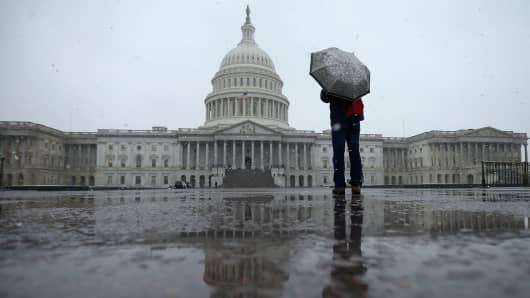"The debt limit is the total amount of money that the United States government is authorized to borrow to meet its existing legal obligations, including Social Security and Medicare benefits, military salaries, interest on the national debt, tax refunds, and other payments."
That is how the U.S. Treasury defines the so called debt ceiling that is being discussed AGAIN in Washington. I emphasize AGAIN because according to the U.S. Treasury, "Since 1960, Congress has acted 78 separate times to permanently raise, temporarily extend, or revise the definition of the debt limit – 49 times under Republican presidents and 29 times under Democratic presidents."
This then begs the question: What is the point of having a debt ceiling/limit if it is always raised and thus never adhered to?
If it was meant to put discipline on U.S. Federal Government spending, well that has failed miserably as total Federal Government debt is now above nominal GDP at $20 Trillion. And, if it has always been raised in the past, what is the point of having it at all.
The debt ceiling was created by Congress in 1917 to allow the U.S. Treasury the ability to borrow money without specific approval each time as long as total borrowing was below a certain level. On paper that made a lot of sense as it gave the Treasury flexibility in its operations and provided a cap on the amount of leverage the government took on. That said, the U.S. government made due before 1917 without one and therefore Congress can figure out a way to go back to a pre-1917 environment without one. As stated, why bother having a limit on debt if the limit is always raised.
The current concern seems to be based on a 'what if 'situation. What if the U.S. government doesn't agree to a rise in the debt limit? It would technically mean a default would follow but it would be a default in name only. Certainly bond holders would get paid back eventually so it would be more of a timing inconvenience than anything else.
While I seem to be pretty nonchalant about the debt limit because I assume it will get raised and even if it misses by a few days (I can't imagine any more than that) it shouldn't be a big deal. But catastrophe has been the word thrown around by some if it is not raised.
Bleeding of hyperbole I believe, the U.S. Treasury's website itself says this, "Failing to increase the debt limit would have catastrophic economic consequences. It would cause the government to default on its legal obligations – an unprecedented event in American history. That would precipitate another financial crisis and threaten the jobs and savings of everyday Americans – putting the United States right back in a deep economic hole, just as the country is recovering from the recent recession."
S&P also used the word 'catastrophic' when they wrote "failure to raise the debt limit would likely be more catastrophic to the economy than the 2008 failure of Lehman Brothers and would erase many of the gains of the subsequent recovery."
In a worst case situation where it is not raised temporarily (because it will eventually be increased), will we see another collapse of the U.S. banking system as we did after Lehman? Of course not.
Bottom line, having a debt limit that is never followed is worthless to have. It instead creates unnecessary drama every time we arrive at it. I have to highlight the hypocrisy in Washington that this never ending debate creates.
The current Director of the Office of Management and Budget (OMB), Mick Mulvaney, said this in 2010 when he was a Congressman in reference to the debt ceiling that he wanted to vote against: "I have heard people say that if we don't do it it will be the end of the world. I have yet to meet someone who can articulate the negative consequences."
Last month Mulvaney said he wanted "the simplest debt ceiling increase that we can get." This is another way of saying he wants a clean increase without conditions.
Back in 2006, Senator Barack Obama said "The fact that we are here today to debate raising America's debt limit is a sign of leadership failure. It is a sign that the U.S. government can't pay its own bills. I therefore intend to oppose the effort to increase America's debt limit." President Obama completely reversed himself and said "the debt ceiling is not a question of authorizing more spending. It simply allows the country to pay for spending that Congress has already committed to." The debt ceiling was raised 8 times under Obama.
Oh, the rhetoric of campaigning versus the reality of governing.
Commentary by Peter Boockvar, the chief market analyst for the Lindsey Group and co-chief investment officer at Bookmark Advisors. Follow him on Twitter @pboockvar.
For more insight from CNBC contributors, follow @CNBCopinion on Twitter.



